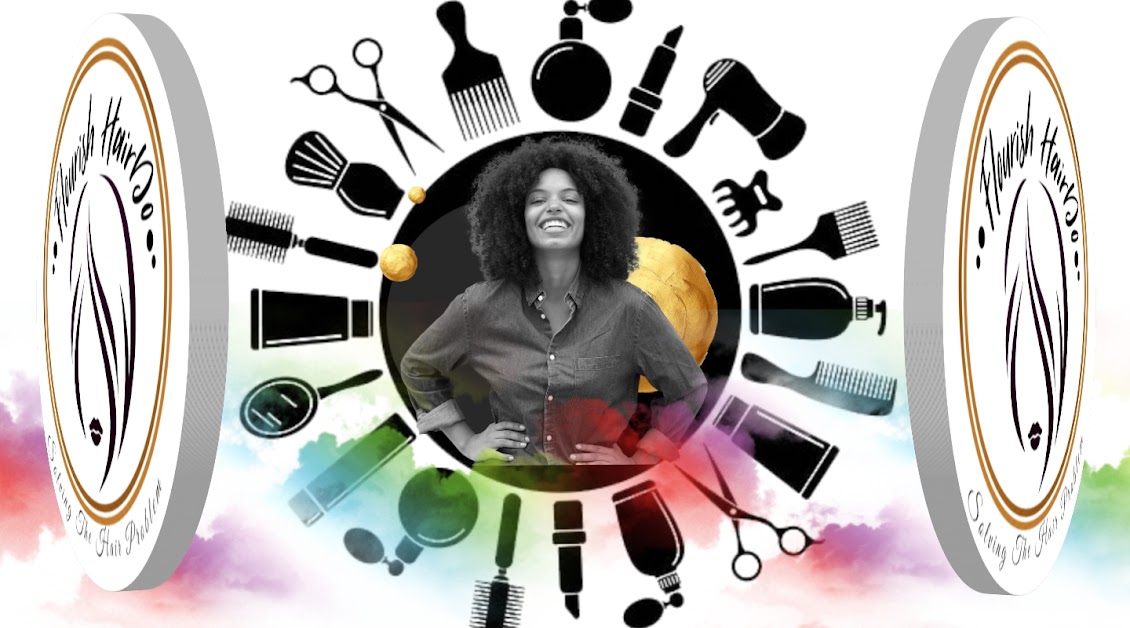hair tends to be very coarse and either coiled or kinked - and in color - African-American hair tends to be black (with only rare variations). However, few people who aren't African-American realize that there are less visible differences.
African-American hair (we'll call it ethnic hair for the purposes of our discussion here) also tends to be porous, which means that moisture easily passes through the cuticle layer of the hair. You see, since ethnic hair tends to be coarse, the cuticle layer of the hair shaft tends to be raised, which means that even though it can readily absorb moisture it also loses moisture easily. Because of this, ethnic hair needs more assistance to stay healthy.
Where European hair can benefit from an occasional oil treatment, it can quickly become oversaturated by oils and be left lank and flat. On the other hand, Ethnic hair needs these oils to protect the hair. In fact, history shows us that oils were a daily part of the hair care process among the citizens of ancient Egypt (dating as far back as 3000 years ago). The oils provide a sealing barrier to hold in the hair's moisture, and keep it soft and manageable.
Common Ethnic Hair Issues:
As we mentioned above, one of the common problems of Ethnic hair is dryness. For this reason, products designed for Ethnic hair are formulated with intense moisturizers, oils, and fats to help hydrate and lock in moisture.
Yet according to a national (American) study conducted earlier this year, the number one problem faced by women with Ethnic hair is breakage (60% of black women identified breakage as their number one problem). While the natural tendency toward dryness doesn't help, the major contributor to the problem of hair breakage among women with Ethnic hair is the methods used to style it. Approximately 80% of black women use some method to straighten their hair. These can range from chemical processes like relaxers and soft-curl perms to the use of heat-styling appliances like irons and blow-dryers.
Chemical relaxers are strong formulas that break the disulfide bonds of the hair allowing it to lie straight. Common relaxers contain strong alkalis that can swell the hair up to twice its normal size, and with hydroxide relaxers the bonds that are broken are permanently broken. Soft curl perms are processes designed to make the natural curl of the hair larger. Both relaxers and soft curl perms are very hard on the hair.
Heat styling is another process that is especially hard on Ethnic hair. The curling irons, flat-irons andstraightening combs commonly used can use heat as high as 400 degrees. Even dryers used for straightening use sufficient heat to leech much of the needed moisture from the hair.
Other Ethnic Hair Hazards:
Another chemical process that can seriously damage Ethnic hair is coloring. Because Ethnic hair is traditionally black (level 1) nearly all haircolor changes require some degree of lightening (bleaching) which can be very damaging to the hair if not carefully done. It is generally recommended that hair color not be lifted more than 4 to 5 levels from the natural color, which does limit the color choices available to women with Ethnic hair.
However, some women want lighter hair and in some cases go from their natural level 1 black color to levels 8 and 9 for bright blondes. This kind of lightening can result in straw-like texture on Ethnic hair even when done professionally and should under no circumstances be attempted without professional assistance. There are many high-end African-American professionals who have been campaigning against the trend of over-lightening Ethnic hair because of the hazards inherent in the process.
It is important to remember that damaged hair cannot be "cured". The only option is to treat the hair with products that will protect it from further damage and help the hair to "look" healthy. Think on this when you are thinking of trying to lighten your hair. The first time you run your fingers through your hair and pull away with a handful of broken ends it will be too late.
All of these processes lead to stressed-out and weakened hair, prone to breaking. Because of this, Ethnic hair undergoing these processes must be treated frequently to strengthen the hair with proteins, re-hydrate the hair with moisture, and seal the hair against moisture loss. It's also imperative that the products used with Ethnic hair reflect these needs. There are many products currently available for Ethnic hair, and the hair care industry is releasing new product lines constantly.
Recommendations:
In the case of Ethnic hair, it is important to use a gentle shampoo and conditioner containing moisture-rich ingredients, and to condition the hair every day, even when you don't shampoo. It is also important to use a light, oil-based treatment to lock-in the moisture and prevent damage from styling. This becomes doubly important if you use heated appliances. Finally, consider a deep-conditioning treatment at least once a week, and protein treatments on at least a monthly basis.
By taking attentive care to the needs of Ethnic hair, you can be assured that you will have healthy hair with which you can be completely happy.
Stacy - Hair Stylist
SOURCE : ©Hairfinder.com



No comments:
Post a Comment
Thanks for sharing your thoughts.. We cherish it...